Susan J. Douglas Famous Quotes
Reading Susan J. Douglas quotes, download and share images of famous quotes by Susan J. Douglas. Righ click to see or save pictures of Susan J. Douglas quotes that you can use as your wallpaper for free.
At the same time that middle- and upper-middle-class mothers were urged to pipe Mozart into their wombs when they're pregnant so their kids would come out perfectly tuned, the government told poor mothers to get the hell out of the house and get to work--no more children's aid for them. Mothers like us--with health care, laptops, and Cuisinarts--are supposed to replicate the immaculate bedrooms we see in Pottery Barn Kids catalogs, with their designer sheets and quilts, one toy and one stuffed animal atop a gleaming white dresser, and a white rug on the floor that has never been exposed to the shavings from hamster cages, Magic Markers accidentally dropped with their caps off, or Welche's grape juice.... we've been encouraged to turn our backs on other mothers who pick their kids' clothes out of other people's trash and sometimes can't buy a can of beans to feed them. How has it come to seem perfectly reasonable--even justified-- that one class of mother is suppoed to sew her baby's diapers out of Egyptian cotton from that portion of the Nile blessed by the god Osiris while another class of mother can't afford a single baby aspirin?
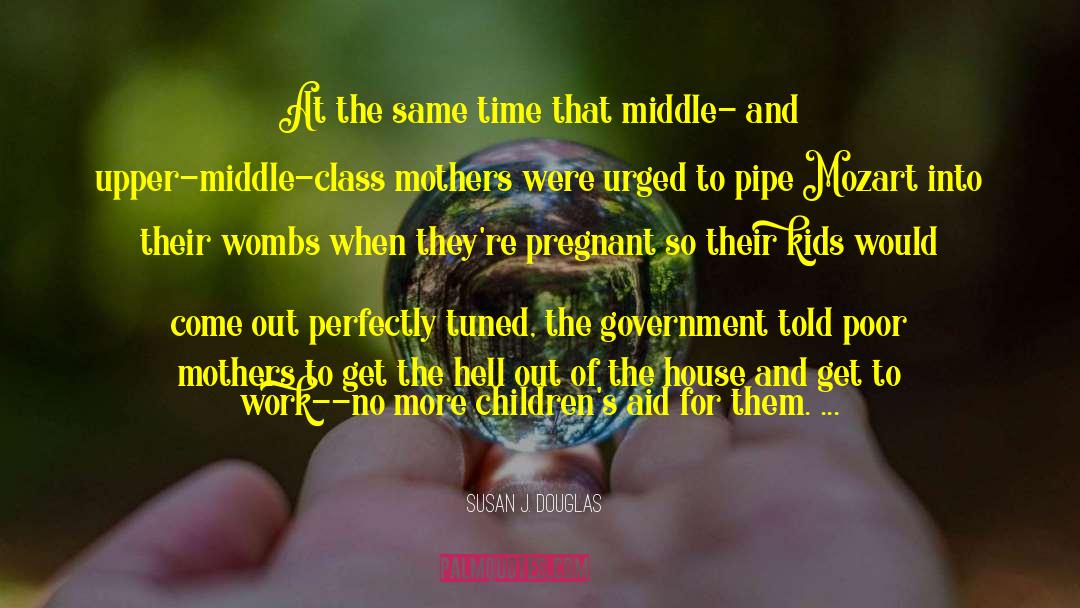
Now, here's the real beauty of this contorting contradiction. Both working mothers and stay-at-home mothers get to be failures. The ethos of intensive mothering has lower status in our culture ("stay-at-home mothers are boring"), but occupies a higher moral ground ("working mothers are neglectful"). So, welcome to the latest media catfight: the supposed war between working mothers and stay-at-home mothers. Why analyze all the ways in which our country has failed to support families while inflating the work ethic to the size of the Hindenburg when you can, instead, project this paradox onto what the media have come to call, incessantly, "the mommy wars." The "mommy wars" puts mothers into two, mutually exclusive categories--working mother versus stay-at-home mother, and never the twain shall meet. It goes without saying that they allegedly hate each other's guts. In real life, millions of mothers move between these two categories, have been one and then the other at various different times, creating a mosaic of work and child-rearing practices that bears no resemblance to the supposed ironclad roles suggested by the "mommy wars." Not only does the media catfight pit mother against mother, but it suggests that all women be reduced to their one role--mother--or get cut out of the picture entirely.
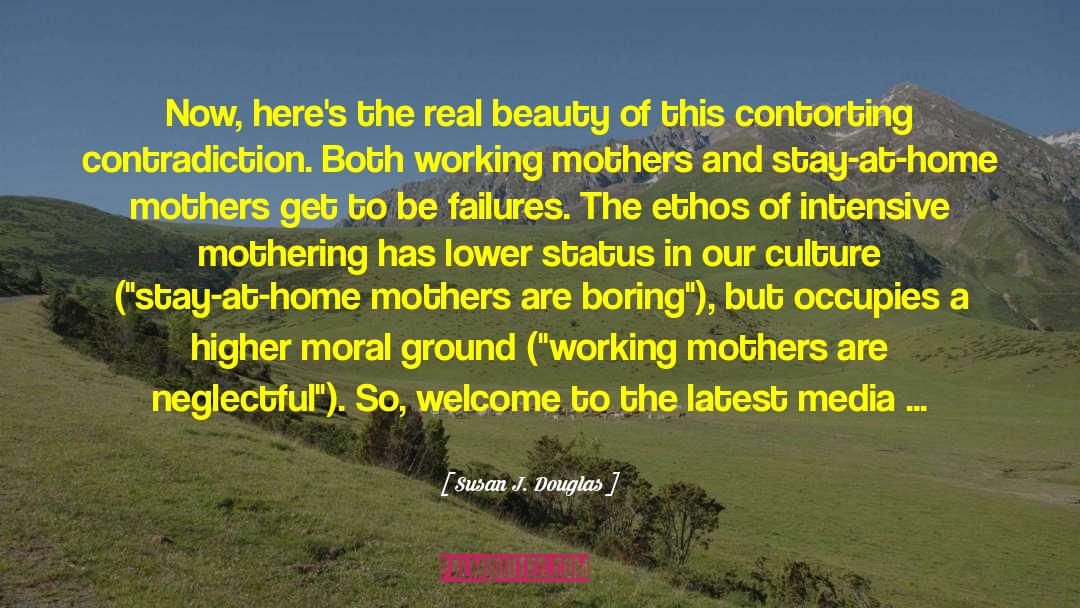
After all, the media have been and are the major dispenser of the ideals and norms surrounding motherhood: Millions of us have gone to the media for nuts-and-bolts child-rearing advice. Many of us, in fact, preferred media advice to the advice our mothers gave us. We didn't want to be like our mothers and many of us didn't want to raise our kids the way they raised us (although it turns out they did a pretty good job in the end). Thus beginning in the mid-1970s, working mothers became the most important thing you can become in the United States: a market. And they became a market just as niche marketing was exploding--the rise of cable channels, magazines like Working Mother, Family Life, Child, and Twins, all supported by advertisements geared specifically to the new, modern mother. Increased emphasis on child safety, from car seats to bicycle helmets, increased concerns about Johnny not being able to read, the recognition that mothers bought cars, watched the news, and maybe didn't want to tune into one TV show after the next about male detectives with a cockatoo or some other dumbass mascot saving hapless women--all contributed to new shows, ad campaigns, magazines, and TV news stories geared to mothers, especially affluent, upscale ones. Because of this sheer increase in output and target marketing, mothers were bombarded as never before by media constructions of the good mother. The good mother bought all this stuff to stimulate, protect, educate, and indulge her kids. S
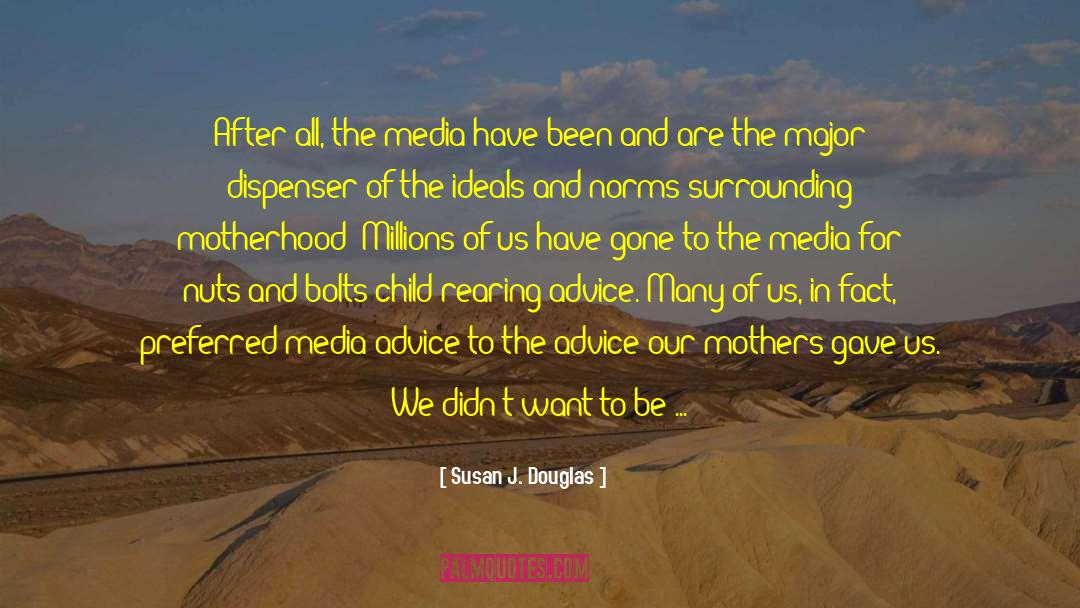
Enlightened sexism is a response, deliberate or not, to the perceived threat of a new gender regime. It insists that women have made plenty of progress because of feminism - indeed, full equality has allegedly been achieved - so now it's okay, even amusing, to resurrect sexist stereotypes of girls and women.
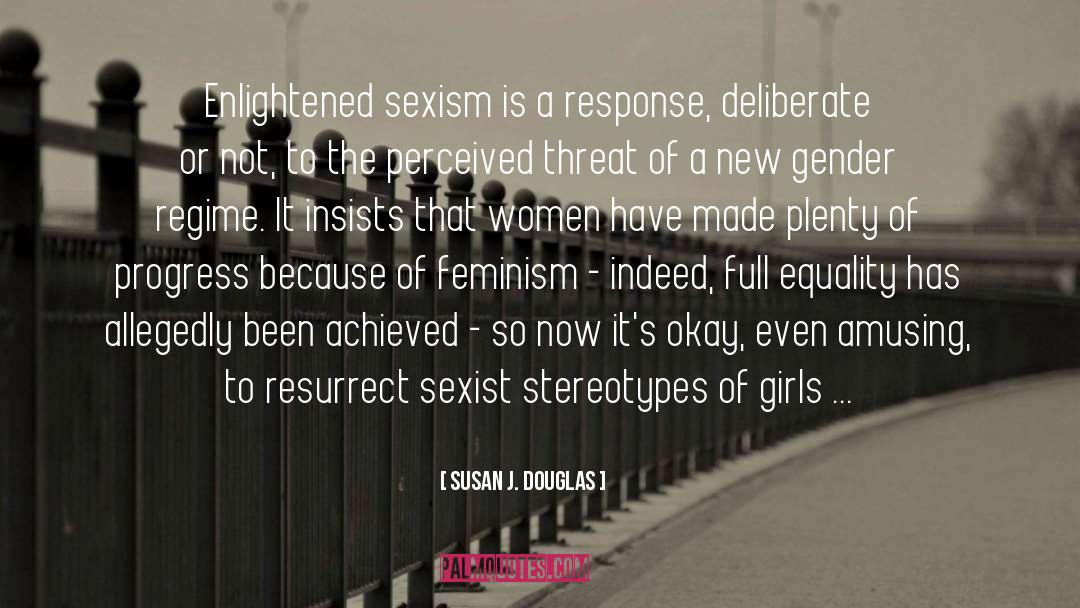
In 1970, Alix Kates Shulman, a wife, mother, and writer who had joined the Women's Liberation Movement in New York, wrote a poignant account of how the initial equality and companionship of her marriage had deteriorated once she had children. "[N]ow I was restricted to the company of two demanding preschoolers and to the four walls of an apartment. It seemed unfair that while my husband's life had changed little when the children were born, domestic life had become the only life I had." His job became even more demanding, requiring late nights and travel out of town. Meanwhile it was virtually impossible for her to work at home. "I had no time for myself; the children were always there." Neither she nor her husband was happy with the situation, so they did something radical, which received considerable media coverage: they wrote up a marriage agreement... In it they asserted that "each member of the family has an equal right to his/her own time, work, values and choices... The ability to earn more money is already a privilege which must not be compounded by enabling the larger earner to buy out of his/her duties and put the burden on the one who earns less, or on someone hired from outside." The agreement insisted that domestic jobs be shared fifty-fifty and, get this girls, "If one party works overtime in any domestic job, she/he must be compensated by equal work by the other." The agreement then listed a complete job breakdown... in other worde, the agreement acknowledged t
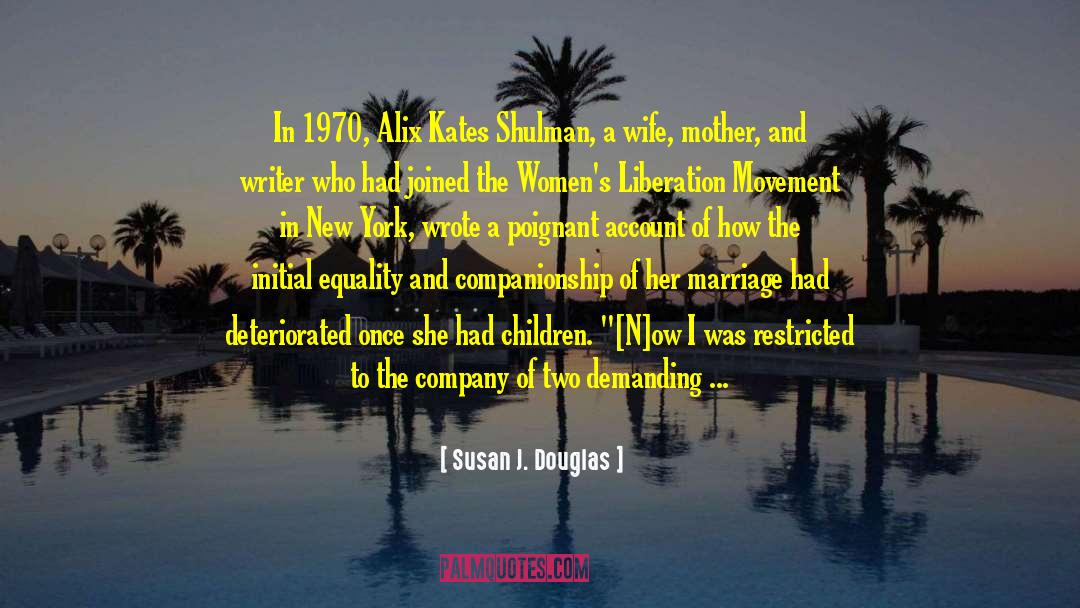
We all know what feminists are. They are shrill, overly aggressive, man-hating, ball-busting, selfish, hairy, extremist, deliberately unattractive women with absolutely no sense of humor who see sexism at every turn. They make men's testicles shrivel up to the size of peas, they detest the family and think all children should be deported or drowned.

There is also the ceaseless outpouring of books on toilet training, separating one sibling's fist from another sibling's eye socket, expressing breast milk while reading a legal brief, helping preschoolers to "own" their feelings, getting Joshua to do his homework, and raising teenage boys so they become Sensitive New Age Guys instead of rooftop snipers or Chippendale dancers. Over eight hundred books on motherhood were published between 1970 and 2000; only twenty-seven of these came out between 1970 and 1980, so the real avalanch happened in the past twenty years. We've learned about the perils of "the hurried child" and "hyperparenting," in which we schedule our kids with so many enriching activities that they make the secretary of state look like a couch spud. But the unhurried child probably plays too much Nintendo and is out in the garage building pipe bombs, so you can't underschedule them either. Then there's the Martha Stewartization of America, in which we are meant to sculpt the carrots we put in our kids' lunches into the shape of peonies and build funhouses for them in the backyard; this has raised the bar to even more ridiculous levels than during the June Cleaver era.

To emphasize how truly backward our society is...let's finish with a little quiz. Let's do it like Jeopardy.
In 1990, this government required companies to give a new mother a year's leave at 90% pay.
Answer: What was Sweden?
This country provided nurseries for most children over eighteen months.
Answer: What was Sweden?
Nearly half of the children under three in this country were in publicly financed nurseries, and nearly 95% of children three to six were (and are).
Answer: What is Denmark?
In this country, 95% of children aged three to five are in preschool.
Answer: What is France?
This country provides care for one quarter of children under three in wholly or partially subsidized nurseries.
Answer: What is France?
In 1984, this country gave workers twelve weeks of maternity leave with pay.
Answer: What is Brazil? (Yes, Brazil!)
This country mandated eight weeks of maternity leave WITH PAY.
Answer: What is Kenya? (You heard us, Kenya!)
This country provided none of these things; instead, to help mothers and small children, its magazines featured profiles of rich celebrity moms who could show women how to do it all.
Answer: What was the United States?
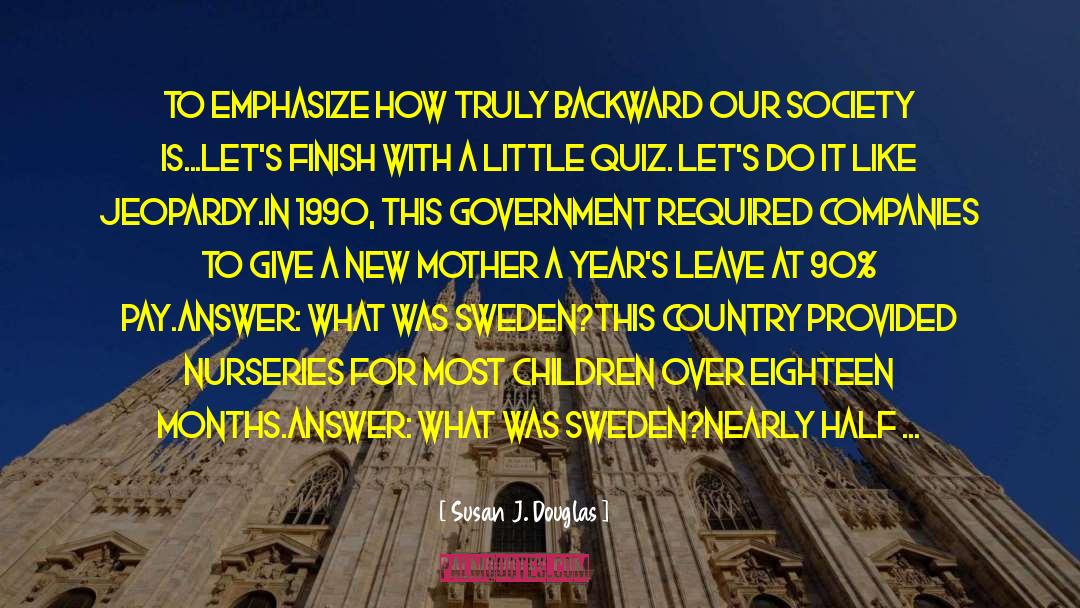
To review briefly, in the late 1960s, men got paid more than women (usually double) for doing the exact same job. Women could get credit cards in their husband's names but not their own, and many divorced, single and separated women could not get cards at all. Women could not get mortgages on their own and if a couple applied for a mortgage, only the husband's income was considered. Women faced widespread and consistent discrimination in education, scholarship awards, and on the job. In most states the collective property of a marriage was legally the husband's since the wife had allegedly not contributed to acquiring it. Women were largely kept out of a whole host of jobs--doctor, college professor, bus driver, business manager--that women today take for granted. They were knocked out in the delivery room... once women got pregnant they were either fired from their jobs or expected to quit. If they were women of color, it was worse on all fronts--work education, health care. (And talk about slim pickings. African American men were being sent to prison and cut out of jobs by the millions.) Most women today, having seen reruns of The Brady Bunch and Father Knows Best, and having heard of Betty Friedan's The Feminine Mystique, the bestseller that attacked women's confinement to the home, are all too familiar with the idealized yet suffocating media images of happy, devoted housewives. In fact, most of us have learned to laugh at them, vacuuming in their stockings and heels, clu

Because the media always serve up heroes and villians, there had to be the terrible mothers, the anti-Madonnas, the hideous counterexamples good mothers were meant to revile. We regret to report that nearly all of these women were African American and were disproportionately featured as failed mothers in news stories about "crack babies," single, teen mothers, and welfare mothers.
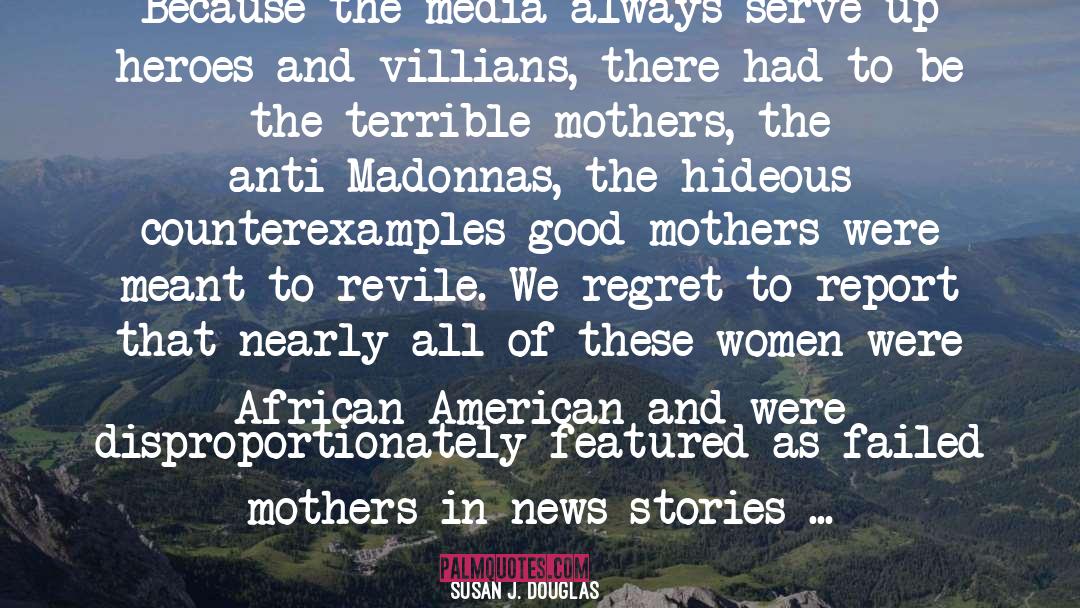
It's 5:22pm you're in the grocery checkout line. Your three-year-old is writhing on the floor, screaming, because you have refused to buy her a Teletubby pinwheel. Your six-year-old is whining, repeatedly, in a voice that could saw through cement, "But mommy, puleeze, puleeze" because you have not bought him the latest "Lunchables," which features, as the four food groups, Cheetos, a Snickers, Cheez Whiz, and Twizzlers. Your teenager, who has not spoken a single word in the past foor days, except, "You've ruined my life," followed by "Everyone else has one," is out in the car, sulking, with the new rap-metal band Piss on the Parentals blasting through the headphones of a Discman. To distract yourself, and to avoid the glares of other shoppers who have already deemed you the worst mother in America, you leaf through People magazine. Inside, Uma thurman gushes "Motherhood is Sexy." Moving on to Good Housekeeping, Vanna White says of her child, "When I hear his cry at six-thirty in the morning, I have a smile on my face, and I'm not an early riser." Another unexpected source of earth-mother wisdom, the newly maternal Pamela Lee, also confides to People, "I just love getting up with him in the middle of the night to feed him or soothe him." Brought back to reality by stereophonic whining, you indeed feel as sexy as Rush Limbaugh in a thong.
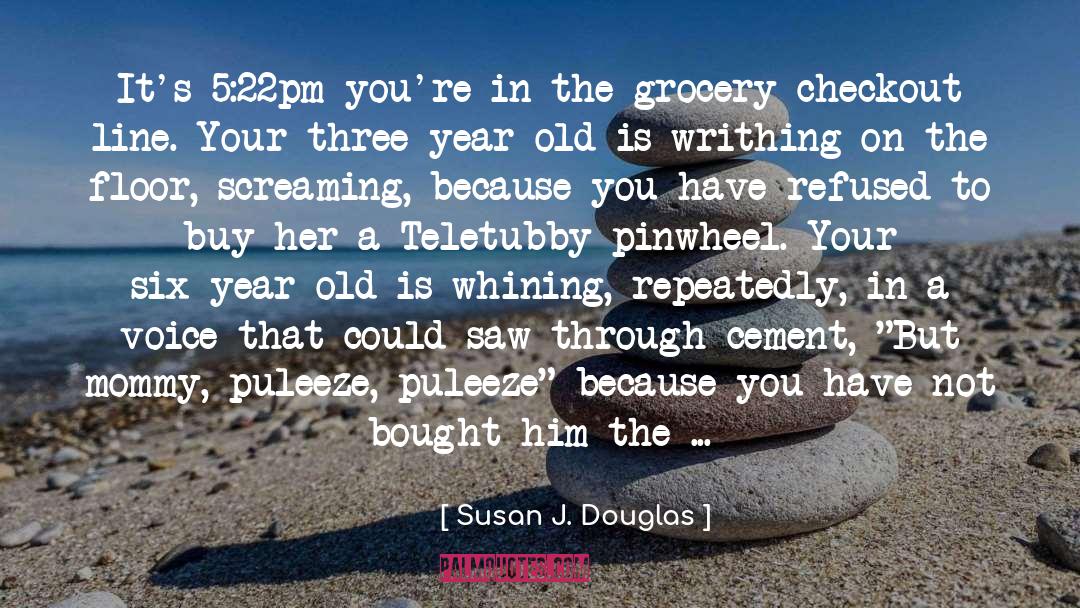
At the very same time that we witnessed the explosion of white celebrity moms, and the outpouring of advice to a surveillance of middle-class mothers, the welfare mother, trapped in a "cycle of dependency," became ubiquitous in our media landscape, and she came to represent everything wrong with America. She appeared not in the glossy pages of the women's magazines but rather as the subject of news stories about the "crisis" in the American family and the newly declared "war" on welfare mothers. Whatever ailed America--drugs, crime, loss of productivity--was supposedly her fault. She was portrayed as thumbing her nose at intensive mothering. Even worse, she was depicted as bringing her kids into the realm of market values, as putting a price on their heads, by allegedly calculating how much each additional child was worth and then getting pregnant to cash in on them. For middle-class white women in the media, by contrast, their kids were priceless, these media depictions reinforced the divisions between "us" (minivan moms) and "them" (welfare mothers, working-class mothers, teenage mothers), and did so especially along the lines of race. For example, one of the most common sentences used to characterize the welfare mother was, "Tanya, who has_____ children by ______ different men" (you fill in the blanks). Like zoo animals, their lives were reduced to the numbers of successful impregnations by multiple partners. So it's interesting to note that someone like Christie Brinkley,

According to Crittenden, young women today are deeply unhappy and confused because they ignored the siren song of the new momism and instead followed the really bad advice of their feminist mothers, who allegedly told their girls to forget marriage and motherhood. Instead, feminist mothers supposedly insisted that happiness only comes to those who climb the corporate ladder by impaling men's balls on their Ferragamo heels. (We are both card-carrying members of the feminist axis of evil, and we know of no mothers of twenty- and thirty-something daughters who have said, "Honey, I definitely do not want grandchildren. I want you to get that promotion and work seventy hours a week instead of sixty." Having heeded their feminist mothers' advice, these loser young women have "postponed marriage and childbirth to pursue their careers only to find themselves at thirty-five still single and baby-crazy, with no husband in sight." (No mention of the fact that once you remove the 10 percent of guys who are gay, and the other 30 percent who are snorting wasabi till they puke because they saw it on Jackass, the pickings can be slim.)

The frenzied hypernatalism of the women's magazines alone (and that includes People, Us, and InStyle), with their endless parade of perfect, "sexy" celebrity moms who've had babies, adopted babies, been to sperm banks, frozen their eggs for future use, hatched frozen eggs, had more babies, or adopted a small Tibetan village all to satisfy their "baby lust," is enough to make you want to get your tubes tied. (These profiles always insist that celebs all love being "moms" much, much more than they do their work, let alone being rich and famous, and that they'd spend every second with their kids if they didn't have that pesky blockbuster movie to finish.)

